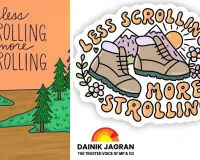Beyond the 9-to-5: Would You Try a "Mini-Retirement" in Your 30s?
Digital Desk
1.jpg)
The FIRE movement is evolving. Discover the rising trend of "mini-retirements"—taking extended, funded breaks throughout your career to travel, learn, and live life now, not later.
The traditional life script—work hard for 40 years, then retire—is being radically rewritten. A new, extreme approach to life planning is taking hold: the "mini-retirement." Instead of saving all your freedom for the end, this strategy involves taking intentional, extended breaks (6-24 months) throughout your prime working years to travel, learn a skill, or pursue a passion, all while funded by careful savings.
Popularized by thought leaders like Tim Ferriss, this concept is a branch of the FIRE (Financial Independence, Retire Early) movement, but with a focus on cyclical living rather than a single, final retirement.
How Does It Work?
The formula is deceptively simple, but requires intense discipline:
1. Aggressive Savings: Live well below your means, often saving 50-70% of your income.
2. Strategic Exit: Build a "mini-retirement fund" separate from your long-term retirement savings. This fund covers all living expenses for the duration of your break.
3. The Break: You quit your job to pursue a planned goal—backpacking through Southeast Asia, writing a novel, volunteering, or learning a language abroad.
4. Re-entry: After the sabbatical, you re-enter the workforce, often with renewed energy, perspective, and skills that make you more valuable than before.
The Trade-Offs
Proponents argue that these immersive experiences are more valuable than two-weeks of vacation a year. They prevent burnout and provide a rich, textured life.
However, critics point to the risks: career gaps can be hard to explain, re-entering the job market can be challenging, and it requires a level of financial austerity that isn't for everyone.
For those willing to prioritize experience over immediate comfort, the mini-retirement offers a compelling, if extreme, alternative to the deferred life plan. It asks one powerful question: Why wait until you're 65 to start living your dreams?
Of course. Based on the latest developments, here are four opinion articles on current public concerns in India. Each is written to be human, engaging, and simple.

.jpg)
.jpg)

2.jpg)






